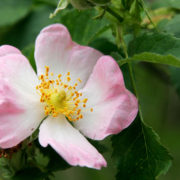St. John’s Wort
(Hypericum perforatum)
An herb that begs to be recognized this time of year is St. John’s Wort. It’s named after St. John the Baptist because it blooms around St. John’s Day. Some herbalists prefer to call this plant St. Joan’s Wort after Joan of Arc. Either way, the association with the sun and with fire is insinuated in the name and its medicine is sometimes called “sunshine in a bottle.”
Family: Hypericaceae
Names: St. John’s Wort, St. Joan’s Wort
Parts Used: flowering tops
Energetics: slightly sweet, mildly bitter, somewhat astringent, cooling
Actions: Nervine, anti-inflammatory, anti-depressant, analgesic, anti-viral, antiseptic, vulnerary
Indications: St. John’s’/Joan’s wort has a special relationship with the sun. It is one of the plants that help to bring sunshine to the dark places, illuminating the shadows of the body and mind. It has a long history of treating melancholy and gloominess (mild to moderate depression), as well as anxiety, nightmares and Seasonal Affective Disorder (SAD). It was considered a remedy for possession by evil spirits in Medieval times, which is sometimes interpreted as referring to psychiatric disorders such as schizophrenia, phobias and nervous breakdown.
It also has an affinity for preventing and healing all degrees of burns. Some sources caution that St. John’s Wort taken internally may cause photo-sensitivity and increase one’s susceptibility to sunburn, but others say that only applies to the capsules and standardized extracts, and that whole plant preparations like tinctures do not produce that effect. Susun Weed uses the infused oil as a sun-protectant for the skin. I use it as a remedy for both sunburn and regular burns from the oven. It reduces pain and redness from the skin very quickly, and I find that only 4-5 applications after a minor burn is needed to resolve all pain & redness, prevent peeling, blisters and scarring.
St. John’s Wort is considered cooling and can help to balance our internal fires when they get too intense. The fire element governs our sense of self worth, our abilities to transform food, and to make decisions. When our fire element is overactive, it can lead to irritability, anger and a desire to control everything. This type of chronic stress fries the nervous system, creates inflammation in the body, and makes us more susceptible to injury. St. John’s wort can ease inflammation, strengthen the nerves, decongest the liver, strengthen our gut-level instincts and heal our aches and pains when we overdo it or accidentally injure ourselves because we were too hasty.
St. John’s wort is wonderful remedy for wound-healing as it relieves pain, helps with tissue repair, and strengthens the integrity & elasticity of the capillaries, arteries & veins.
As an antiviral, St. John’s Wort has been shown to be useful in countering viruses such as HIV, herpes, measles, hepatitis A & B, and influenza.
It is overall a widely applicable plant and an indispensable part of any medicine cabinet, for its abilities to cheer you up, ease your aches & pains, strengthen the nerves, heal burns and counter infection.
External Uses: for wounds, burns, blisters, rashes, abrasions, bed-sores, bruises, boils & stings. It also makes a great massage oil for nerve pain, muscle spasm, stiffness & sprains. Its antiviral properties do pass through the skin and can be useful in cases of shingles.
Contraindications: St. John’s Wort should not be taken concurrently with prescription anti-depressants. Because St. John’s wort is such a potent liver cleanser, it is also contraindicated for any medications that are metabolized via the CYP-450 pathway in the liver. It will cause your body to eliminate these drugs much more quickly. Please do your due diligence to make sure that St. John’s Wort does not interact with any of your medications before taking this herb.
This information is intended for educational purposes only and is not meant to diagnose, treat, or cure any disease.


